More than 70 years after his birth and almost a decade after his death, Netflix pays tribute to Juan Gabriel with a documentary series that celebrates his music and reveals the man behind the legend. Juan Gabriel: Debo, Puedo y Quiero (Juan Gabriel: I Must, I Can, I Will), a Mexican production, offers an intimate and unprecedented journey through the life of Alberto Aguilera Valadez, known artistically as the one and only Juan Gabriel.
Directed by María José Cuevas (Bellas de Noche, 2016) and produced by Laura Woldenberg and Ivonne Gutiérrez, the four-episode series portrays the personal and professional journey of Juanga (as he was affectionately known) from his humble beginnings, through the meteoric rise that made him Mexico’s most beloved musical icon, to his final years.
According to the production team, this series is different as it offers unprecedented access to his life, his sensitivity, and his inexhaustible passion for living and creating.
In this sense, Juan Gabriel: Debo, Puedo y Quiero has been created from unpublished material belonging to Alberto Aguilera Valadez himself, who for decades used a camera to record important moments in his life.
The series is based on more than 2,000 personal videotapes, 30,000 photographs, hundreds of notebooks, and cassettes, which added up to countless hours of material that was viewed and analyzed. Through the use of his own home recordings, the series allows the public to “get to know and understand Juan Gabriel.”
One of the project’s greatest successes is that its director, María José Cuevas, organized the content so that Alberto Aguilera Valadez himself could tell his story, accompanied by the voices of his children, friends, and closest collaborators. The innovative nature of this material and the narrative choice adopted allow viewers to approach his life in a unique and very personal way.
A novel aspect of the series is that it focuses on the artist’s creative process. “I made loneliness my friend,” Juanga says in a revealing moment, and little by little it becomes clear how he transformed his loneliness into inspiration and how he turned his pain into a musical legacy.
We soon learn that he hummed melodies incessantly and wrote the lyrics of his upcoming songs on scraps of paper and napkins that he left scattered around his house. He confesses that as a child he was “very lazy” and “unbearable,” but he would pick up his notebook and pencil because the “songs wanted to be born.”
The new Netflix series captures the dazzling and transgressive magic of “El Divo de Juárez,” who died of natural causes at the age of 66 in 2016, while delving into his more intimate side offstage. Overall, Juan Gabriel: Debo, Puedo y Quiero shows his struggles, ambitions, and immeasurable talent, highlighting, above all, his profound humanity.
“What makes this project unique is the immersion in the man’s two personalities: the private and public figures,” director María José Cuevas explains to Billboard Español. “Juan Gabriel was music. Alberto Aguilera Valadez was his pause.”
Throughout its four chapters, Cuevas and her team paint an honest portrait of the Mexican, showing both Alberto’s and Juan Gabriel’s true nature.
In turn, the documentary examines how Juan Gabriel overcame the stigmas characteristic of his era and his country of origin, such as classism, machismo, and homophobia, leaving a lasting contribution to Mexican culture.
“Juan Gabriel went against the grain, overcoming obstacles. He did what he wanted. The challenges he faced are not the same as those faced by artists today. Telling his personal story goes hand in hand with telling the story of Mexico during these four decades,” producer Laura Woldenberg explained to Produ.
A formidable career that influenced Latin music
For those unfamiliar with him, few artists have left such a lasting mark on Latin American music. In addition to being a powerful performer, Juan Gabriel served as an arranger, producer, and composer, positioning him as Mexico’s most relevant commercial singer-songwriter.
Juanga was renowned for his epic stage performances, which often featured an orchestra and numerous mariachis dressed in tight jackets and hats. Throughout his career, spanning more than 45 years, he produced more than 1,800 songs, 32 studio albums, and three live albums from the Palacio de Bellas Artes.
The singer of songs such as Querida, Hasta que te conocí, Amor eterno, and Abrázame muy fuerte sold more than 100 million albums, making him the best-selling Mexican artist of all time.
He also collaborated with hundreds of different artists, including Daniela Romo, Ana Gabriel, Luis Miguel, Rocío Dúrcal, Isabel Pantoja, and José José. According to the Mexican Society of Authors and Composers (SACM), one of his songs is heard somewhere in the world every 40 seconds.
Needless to say, throughout his career he received numerous awards and musical recognitions for his work. Among his achievements is a star on the Hollywood Walk of Fame, awarded on May 10, 2002.
Our verdict
For his lifelong fans, the documentary Debo, Puedo y Quiero represents an exceptional opportunity to rediscover the artist from an intimate perspective, as if entering his personal universe. Even if you have already seen the biographical series Hasta que te conocí, this documentary offers a different and complementary perspective, based on real archives rather than dramatization.
For younger generations, it is an introduction to the indomitable spirit of an artist who lived without inhibitions, and whose music continues to convey universal truths about love, loss, and, in particular, resilience in the face of adversity.
In short, don’t hesitate to press play.

